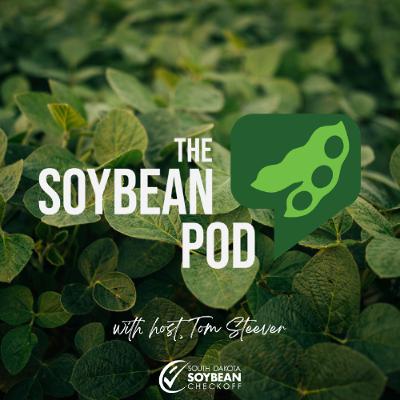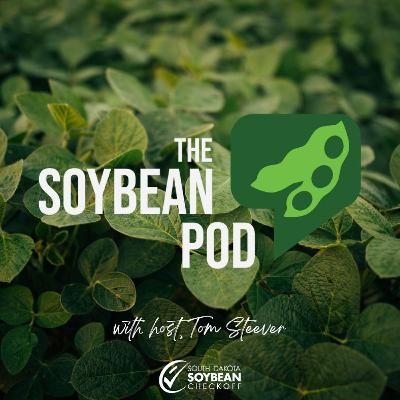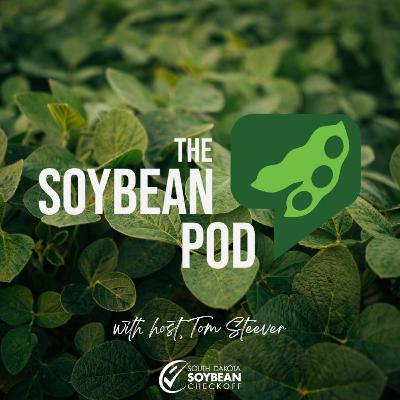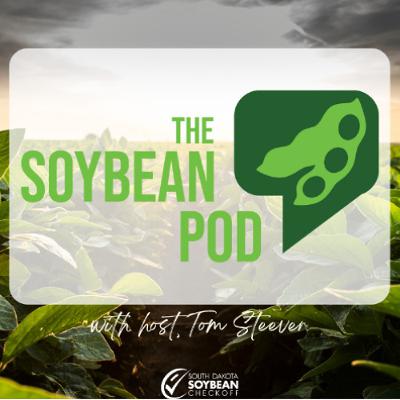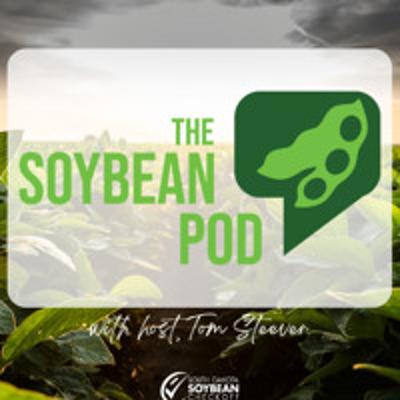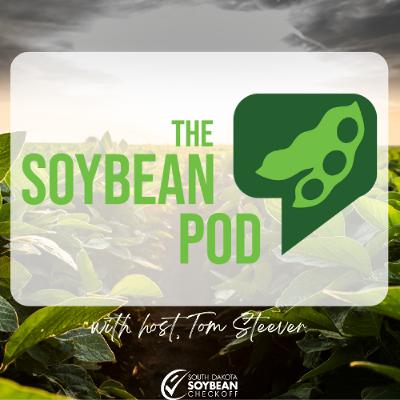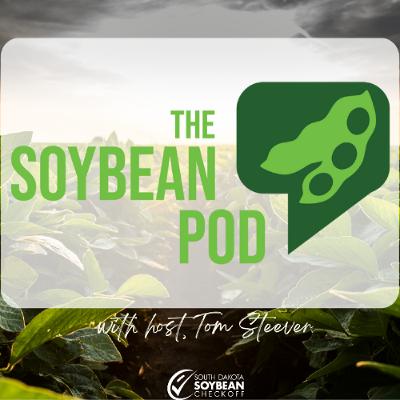Discover The Soybean Pod
The Soybean Pod

The Soybean Pod
Author: SD Soybean
Subscribed: 1Played: 22Subscribe
Share
© All rights reserved
Description
On The South Dakota Soybean Pod, we’re discussing the incredible soybean, the people who grow it, and why that crop is so important. Brought to you by South Dakota soybean farmers and their checkoff & hosted by Tom Steever.
60 Episodes
Reverse
There’s been a lot of noise about seed oils, including soybean oil. Some of it, specifically from U.S. Health and Human Services Secretary Robert F. Kennedy Junior is critical, blaming the oils for inflammation and chronic diseases like type II diabetes and obesity. Dr. Mark Messina could not disagree more. On this edition of The Soybean Pod, Dr. Messina, director of nutrition science and research at Soy Nutrition Institute Global, cites evidence of a much different story.
A bio-adjuvant being developed with support from the South Dakota Soybean Checkoff at Dakota BioWorx in Brookings, South Dakota, will enhance the efficacy of crop protection sprays while yielding a dry material that shows promise in treating white mold and other crop ailments. “The beautiful thing about it is this is derived from soybean,” says Dr. Matthew Cole, founder and CEO of Pioneer Biotech. “We’re fermenting bio-adjuvants from soybean.”
Dakota BioWorx is housed in the new POET Bioproducts Center at the South Dakota State University Research Park. The firm is home to a bunch of bioprocessing labs, bioreactors and processing facilities that help scale up bioproduct ideas that are getting closer to commercial launch and success. In this edition of the Soybean Pod from South Dakota soybean farmers and their checkoff, we’ll talk to Dakota BioWorx CEO Neal Connors about what goes on at The Soybean Checkoff-supported pilot facility.
Research and experience point to the conclusion that reducing tillage is a good farm production practice. On this edition of The Soybean Pod from South Dakota soybean farmers and their checkoff, our guest is Peter Kovacs, an associate professor in the Department of Agronomy, Horticulture and Plant Science at South Dakota State University. Kovacs talks about Soybean Checkoff-supported research on reduced tillage, and how it conserves soil, water, time, energy and money. Kovacs also tells the story of what brought him to South Dakota from his native Hungary.
Zach Smith went from an upbringing in the shadow of Disney World to doing soybean feeding trials on South Dakota beef cattle. On this edition of The Soybean Pod from South Dakota soybean farmers and their checkoff, we’ll talk to the central Florida native about that checkoff-supported research being conducted at South Dakota State University. With a calculator at the ready, Smith, an associate professor in animal science, lays out what’s possible, and how feeding soybeans to cattle might eventually pencil out.
Biobased diesel fuels – many of them sourced from soybeans – are breaking records. Numbers associated with these liquid fuels are impressive and continue to rise. On this edition of The Soybean Pod from South Dakota soybean farmers and their checkoff, Kate Shenk, director of regulatory affairs for Clean Fuels Alliance America, talks about those numbers and what they mean for soybean farmers and rural communities.
The soybean market is hurting compared to its high-water mark. The robust markets soybean growers enjoyed in 2012 and 2022 seem a distant memory. In this edition of The Soybean Pod from South Dakota soybean growers and their checkoff, agriculture economist Ben Brown at the Food and Agricultural Policy Institute offers insights into why the markets are soft, as well as where they might go and how to navigate them.
A South Dakota State University study indicates the adoption of conservation practices like reduced or no-tillage contributes to yield increases and improvements in soil health. In this edition of The Soybean Pod from South Dakota soybean farmers and their checkoff, Dr. David Clay, Distinguished Professor of soil science at SDSU, explains how that has happened and how conservation farming can improve productivity.
During the spring of 2025, South Dakota farmers experienced and endured all manner of weather through the planting and early growing seasons. On this edition of the Soybean Pod, American Soybean Association Corteva Young Leader Program alumnus and current SDSA board member Jeff Kloucek talks about his satisfaction with the season in the short time since planting and about his approach to crop consulting, his “main job.” Kloucek also reveals his secret desire to satisfy appetites with the best smoked pulled pork possible.
It’s difficult to get groups to agree, but AgUnited for South Dakota has successfully brought several commodity and farm advocacy organizations together in agreement. Don Norton, a former CEO of South Dakota Agriculture and Rural Leadership, is its executive director. On this edition of the Soybean Pod, Norton explains how an organization becomes more than the sum of its parts by speaking with a unified voice on those issues where the groups – seven of them – share common ground.
It’s a tall order to guess which weeds will cause problems in any given year, but the guest on this edition of The Soybean Pod dives in. Weed Management Specialist Eric Jones at South Dakota State University hedges his bets, however, pointing out that weed seeds from wet and dry years are viable. He also discusses the ongoing threat of weeds developing resistance. It’s making managing weeds more difficult with each passing year. One after another, weeds are becoming resistant to management chemistry, leaving very few effective herbicides.
A Salem, South Dakota farmer was honored by the American Soybean Association for his attention to conservation in his farming operation. Kurt Stiefvater was one of four regional honorees for The Conservation Legacy Award program and was recognized at the 2025 Commodity Classic in Denver. On this edition of the Soybean Pod, Kurt talks about what his conservation practices are and why he incorporates them into his farming operation. He also reveals what farming methods are the least stressful.
One of the more daunting financial threats to the family farm, according to attorney Jayna Voss at Legacy Law Firm, is long-term nursing care, especially when that care is unplanned. It’s expensive emotionally and financially. But if farmers and their families plan, says Voss, on this edition of The Soybean Pod, there’s a much greater chance that these and other burdens can be withstood with the family farm intact.
It’s an interesting path that led Indiana native Damian Mason to his current gig as an independent agriculture commentator and analyst. The public speaker keynoted South Dakota AgOutlook and spent some time after that giving his opinions on the current state of affairs for farmers and what he sees as their future. It was an insurance settlement for an unfortunate amputation involving Damian’s father that helped fund the purchase of his family’s dairy farm. That farm was Mason’s beginning in agriculture.
2025 brought a lot of change to the federal policy landscape. Those changes have meant economic uncertainty for farmers. Among the speakers and experts that the South Dakota Soybean Association invited to present at the 2024 AgOutlook Conference and Tradeshow last December was Matt Erickson, the Ag Economic and Policy Advisor for Farm Credit Services of America. On this edition of the Soybean Pod featuring Erickson, we address economic uncertainty and what might be expected on the agriculture horizon.
Varying skills and backgrounds bring a diverse array of perspectives to the South Dakota Soybean Association (SDSA) board. Director Dan Nigg of Sisseton, South Dakota, is active on the SDSA board as well as on the board of his local cooperative elevator. That provides insights into what it takes to ship millions of bushels of soybeans from South Dakota to Pacific Northwest ports from which they’re exported to China and Southeast Asia. On this edition of the Soybean Pod, Nigg talks about what being on the SDSA board has taught him, and what he can share with other soybean growers about his knowledge of railroad logistics.
Ross Tschetter is not afraid to put himself out there. He likes people, resulting in his involvement in more than one program that promotes self-improvement and leadership skills. He puts those skills to use in his community, as part of a local USDA committee and among soybean growers. In this edition of the Soybean Pod, we talk to Tschetter about what motivates him, about his farm, and about his take on soybean demand and dealing with a soft soybean market.
Northern Soy Marketing exists because of the history of soybean export purchases based on crude protein content. Soybeans grown at the latitude of South Dakota, Minnesota and Wisconsin don’t have the oil and protein concentration of soybeans produced in more southerly climates. On this edition of the Soybean Pod, we’ll talk to Mike McCranie of Claremont, South Dakota, a member of the Northern Soy Marketing board, about research that shows northern-grown soybeans to have unique attributes making the meal from these soybeans attractive as livestock feed.
Researchers at South Dakota State University (SDSU) have been working to improve nitrogen-fixing capabilities in soybeans. The hoped-for outcome, according to Sen Subramanian, plant scientist and agronomy professor at SDSU, is an increase in soybean yields while at the same time preserving soil health. On this edition of the Soybean Pod, we talk to Subramanian about his hypothesis that natural biological nitrogen fixation can meet the soybean plant's nutrient needs later in the growth cycle. This would ensure high yields without applying synthetic fertilizers.
Todd Hanten will miss getting first-hand information on how Soybean Checkoff dollars are being invested. The farmer from Goodwin, South Dakota, not far from Watertown, retired from the checkoff board after three terms, nine years, as a director. He’s proud of what he, along with fellow board members, accomplished. On this edition of The Soybean Pod, among other subjects, we talk with Todd about his favorite part of serving on the checkoff board, as well as how he got into farming.


